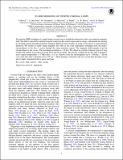Files in this item
3D MHD modeling of twisted coronal loops
Item metadata
| dc.contributor.author | Reale, F. | |
| dc.contributor.author | Orlando, S. | |
| dc.contributor.author | Guarrasi, M. | |
| dc.contributor.author | Mignone, A. | |
| dc.contributor.author | Peres, G. | |
| dc.contributor.author | Hood, A. W. | |
| dc.contributor.author | Priest, E. R. | |
| dc.date.accessioned | 2016-09-12T11:30:16Z | |
| dc.date.available | 2016-09-12T11:30:16Z | |
| dc.date.issued | 2016-10-10 | |
| dc.identifier | 244719298 | |
| dc.identifier | dec53ba3-c574-4b80-8591-17fa36b5917a | |
| dc.identifier | 84991010696 | |
| dc.identifier | 000385633900004 | |
| dc.identifier.citation | Reale , F , Orlando , S , Guarrasi , M , Mignone , A , Peres , G , Hood , A W & Priest , E R 2016 , ' 3D MHD modeling of twisted coronal loops ' , Astrophysical Journal , vol. 830 , no. 1 , 21 . https://doi.org/10.3847/0004-637X/830/1/21 | en |
| dc.identifier.issn | 0004-637X | |
| dc.identifier.other | BibCode: 2016arXiv160705500R | |
| dc.identifier.other | ORCID: /0000-0003-2620-2068/work/58055121 | |
| dc.identifier.other | ORCID: /0000-0003-3621-6690/work/74117708 | |
| dc.identifier.uri | https://hdl.handle.net/10023/9475 | |
| dc.description.abstract | We perform MHD modeling of a single bright coronal loop to include the interaction with a non-uniform magnetic field. The field is stressed by random footpoint rotation in the central region and its energy is dissipated into heating by growing currents through anomalous magnetic diffusivity that switches on in the corona above a current density threshold. We model an entire single magnetic flux tube, in the solar atmosphere extending from the high-beta chromosphere to the low-betacorona through the steep transition region. The magnetic field expands from the chromosphere to the corona. The maximum resolution is ~30 km. We obtain an overall evolution typical of loop models and realistic loop emission in the EUV and X-ray bands. The plasma confined in the fluxtube is heated to active region temperatures (~3 MK) after ~2/3 hr. Upflows from the chromosphere up to ~100 km/s fill the core of the fluxtube to densities above 109 cm-3. More heating is released in the low corona than the high corona and is finely structured both in space and time. | |
| dc.format.extent | 15 | |
| dc.format.extent | 2968915 | |
| dc.language.iso | eng | |
| dc.relation.ispartof | Astrophysical Journal | en |
| dc.subject | Sun: corona | en |
| dc.subject | Sun: activity | en |
| dc.subject | QB Astronomy | en |
| dc.subject | QC Physics | en |
| dc.subject | NDAS | en |
| dc.subject.lcc | QB | en |
| dc.subject.lcc | QC | en |
| dc.title | 3D MHD modeling of twisted coronal loops | en |
| dc.type | Journal article | en |
| dc.contributor.sponsor | Science & Technology Facilities Council | en |
| dc.contributor.sponsor | Science & Technology Facilities Council | en |
| dc.contributor.institution | University of St Andrews. Applied Mathematics | en |
| dc.identifier.doi | https://doi.org/10.3847/0004-637X/830/1/21 | |
| dc.description.status | Peer reviewed | en |
| dc.identifier.url | http://adsabs.harvard.edu/abs/2016arXiv160705500R | en |
| dc.identifier.grantnumber | ST/N000609/1 | en |
| dc.identifier.grantnumber | ST/L005522/1 | en |
This item appears in the following Collection(s)
Items in the St Andrews Research Repository are protected by copyright, with all rights reserved, unless otherwise indicated.

